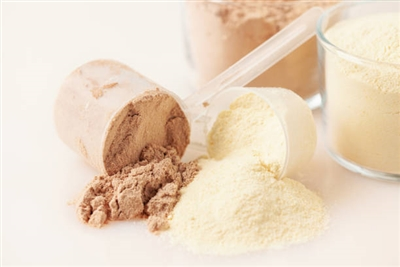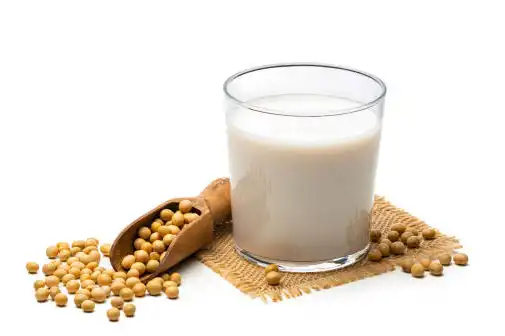Is Soy Isolate Protein Powder Healthy?
Soy isolate protein powder has become an increasingly popular supplement, especially among vegetarians, vegans, and those looking to add extra protein to their diets. However, there is some debate about whether soy isolate protein powder is truly a healthy choice. In this blog post, I'll explore the pros and cons of soy isolate protein powder and look at some of the key considerations regarding its health impacts.
What Is Soy Isolate Protein Powder?
Soy isolate protein powder is a supplement made by isolating the protein from defatted soybeans. The fat and carbohydrates are removed from the soybeans, leaving behind a refined protein powder that contains 90-95% protein.

Soy isolate protein typically contains less fat, carbs, and fiber compared to other soy-based protein powder like soy protein concentrate. The isolate process also removes compounds like oligosaccharides that can cause digestive issues for some people. This makes soy isolates one of the more easily digestible forms of soy protein.
The protein in soy isolate powder is considered a complete protein, meaning it contains all nine essential amino acids. This makes it a good option for vegans and vegetarians looking to get enough protein in their diets. Soy isolate protein is also lactose-free.
Potential Health Benefits Of Soy Isolate Protein
There are several potential health benefits associated with soy isolate protein powder:

High In Protein
One serving of soy isolate protein powder typically contains 20-25 grams of protein. This makes it an convenient way to add extra protein to your diet, which can help with building muscle mass and weight management. The high quality complete protein in soy isolate powder may also increase feelings of fullness.
Source Of Isoflavones
Soy foods contain isoflavones like genistein and daidzein. These compounds are categorized as phytoestrogens and may mimic some of the effects of estrogen in the body. Studies show isoflavones may help reduce risk factors for heart disease, osteoporosis, and certain cancers. However, effects seem to depend on age and health status.
May Lower Cholesterol
Several studies have found soy protein isolate may help lower LDL (bad) cholesterol levels. This effect seems most notable in people with high cholesterol. The cholesterol-lowering properties are likely due to the isoflavones.
Helps Control Blood Sugar
Research indicates soy isolate protein powder may improve glycemic control. The amino acids and fiber in soy protein help moderate the absorption of sugars, leading to a more stable blood sugar rise after eating. This makes soy isolate a good supplement for those with diabetes or metabolic syndrome.
Potential Health Concerns With Soy Isolate Protein
However, there are some potential downsides and precautions to consider with soy isolate protein powder:
Phytoestrogen Effects
The impact of phytoestrogens on hormone levels is complex. There is limited evidence that soy isoflavones raise estrogen levels sufficiently to cause concern. However, people with hormone-sensitive conditions like breast cancer may want to exercise caution with high soy intake from supplements.
Thyroid Function
Some research shows high soy consumption may impact thyroid function by suppressing thyroid hormone secretion. This seems most likely in those with compromised thyroid function or iodine deficiency. Those with thyroid issues may want to limit soy isolate intake to be safe.
Allergies And Intolerances
Soy is one of the 8 major food allergens. Soy isolate protein powder should be avoided by anyone with a soy allergy. Even people who normally tolerate some soy may react to the concentrated isolate powder. There is also some evidence that soy can trigger digestive issues like bloating, cramps, and diarrhea in sensitive people.
Kidney Stones
The oxalates found in soy foods may contribute to kidney stone development in prone individuals. While soy isolate powder is low in oxalates, excessive intake combined with other high-oxalate foods may pose a risk for those with a history of kidney stones.
Nutrient Absorption
Compounds in soy can interfere with the absorption of nutrients like iron and zinc. This effect seems strongest when consuming soy isolate protein powder in high amounts without compensating with greater mineral intake.
Who Might Benefit From Soy Isolate Protein?
Within reasonable amounts, soy isolate protein powder appears suitable for most healthy adults seeking an extra protein boost. Here are some examples of populations who may find it particularly beneficial:
Vegetarians and vegans who want an easy complete plant-based protein source.
Older adults who need extra protein for muscle retention but want an easily digestible option.
Physically active individuals looking to build and repair muscle tissue.
Post-menopausal women who may benefit from soy isoflavones for bone and heart health.
Those with diabetes or metabolic disorders who need help managing blood sugar rises.
As long as soy is tolerated well, soy isolate protein powder can be a nutritious protein option for these groups under the guidance of a dietitian or doctor. Those with soy allergies, thyroid issues, kidney problems, or on medication should exercise caution and consult their healthcare provider before using soy isolate protein powder.
How Much Soy Isolate Protein Powder Is Safe?
Most health organizations consider soy safe within typical dietary intake levels. For reference, traditional Asian diets may provide up to 50-100mg of isoflavones from soy foods daily.
For supplemental soy isolate protein powder, 25-50g (1-2 scoops) per day is generally considered safe for most healthy adults. Higher amounts up to 100g per day appear safe for periods of time when needed to meet protein needs.
People with digestive sensitivities may want to start with 10-15g (1/2 scoop) at a time to assess tolerance. Those with soy allergies should avoid soy isolate powder altogether due to the risk of a reaction.
As with any supplement, it's ideal to include soy isolate protein powder as part of a balanced diet focused on whole foods. Using soy isolate protein powder in moderation can allow you to reap the benefits while minimizing any potential risks.
Conclusion
Soy isolate protein powder offers a convenient way to add plant-based protein to your diet as part of a healthy lifestyle. Research suggests soy isolate may offer benefits for muscle building, weight management, blood sugar control, and heart health. However, some precautions are needed for those with thyroid issues, kidney disease, or sensitivities to soy. When used in moderate amounts as part of an overall nutritious diet, soy isolate protein powder can be a safe, effective option for meeting protein needs. However it's ideal to consult your healthcare provider if you have any concerns about using soy isolate protein powder.
If you want to get more information about plant extract powder, please email us at angel@angelbiology.com for more information!


